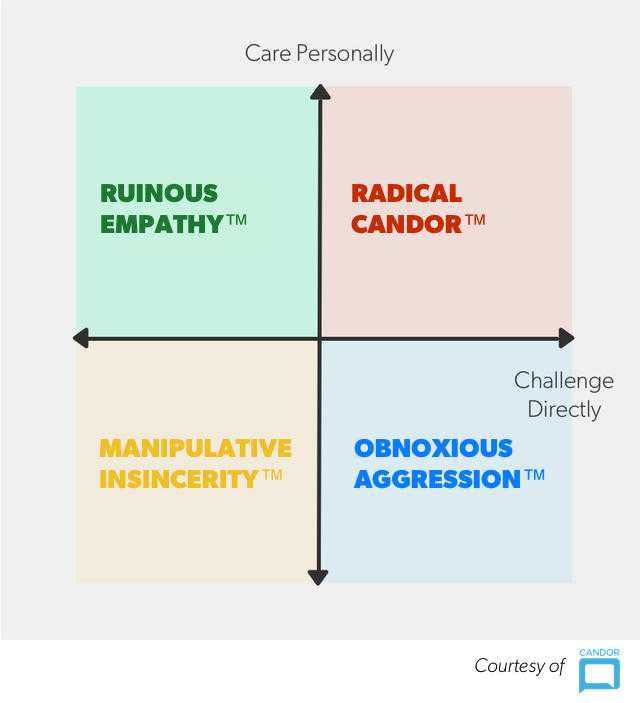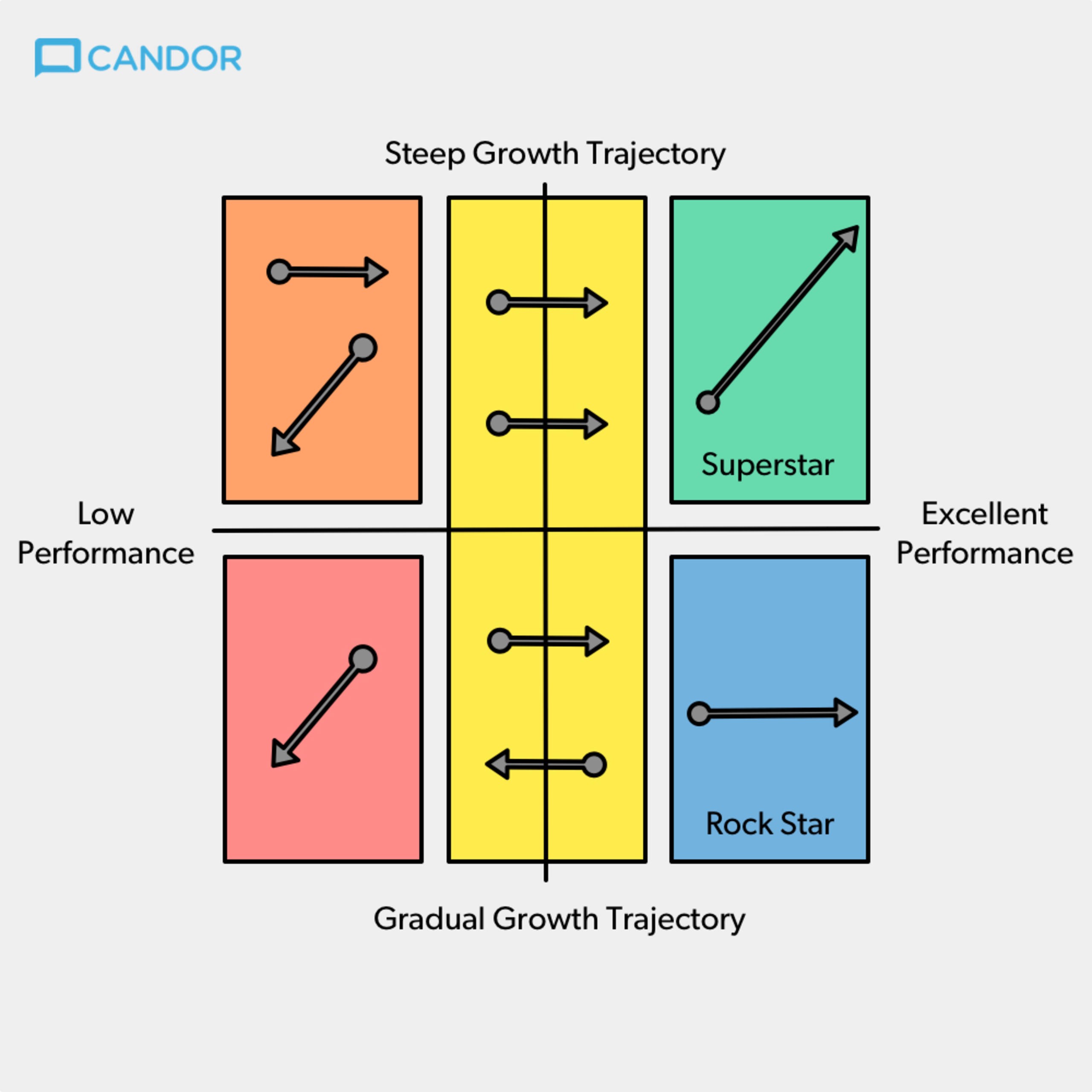Radical Candor explained
Radical Candor: Be a Kickass Boss without Losing Your Humanity by Kim Scott is a book about Scott's successful management methods for individual growth and the overall success of a team, along with practical suggestions for implementing radical candor in any organization.
While working on Google's Adsense product, Scott was a direct report to Sheryl Sandberg (now COO of Facebook), who consistently gave candid feedback. Sandberg's ability to offer feedback, show care personally, and provide honest feedback, elevated Sandberg's teams and was a major contributor in their success. Scott went on to work at Apple and eventually become a co-founder of Candor, Inc, sharing her teachings on how business operations can work better with radical candor. The radical candor framework has become one of the buzziest terms in Silicon Valley since the book's publication.
Scott believes that people want to do good work. By not telling them, clearly, where they are going wrong, you're limiting their potential. In order to empower your teammates to do their best work, you should be using radical candor in the workplace.
tl;dr? For successful radical candor:
- Care personally
- Challenge directly
- Understand that you are not your work
- Actively seek feedback and allow space for processing
What is radical candor?
According to Kim Scott's book, there are four kinds of organizations categorized by whether the teammates:
Care personally about each other
Are willing to challenge each other
There are four categories along this matrix and there can be successful companies in each of the radical candor quadrants:

Obnoxious Aggression:
In the bottom right quadrant, you have Obnoxious Aggression. Obnoxious Aggression is when teams challenge directly but don't care personally. The Hollywood stereotype of hyper-competitive law firms or investment bankers fit the bill here. Think Wolf of Wall Street-environments that are described as "cutthroat," where "front-stabbing" is commonplace.
Manipulative Insincerity:
Toxic workplaces with backstabbing and politics often run on Manipulative Insincerity, like the teams in Veep or Succession. Manipulative insincerity is when you neither care personally, nor challenge directly.
Ruinous Empathy:
When you care personally but don't challenge directly, you'll find yourself in what Scott calls "Ruinous Empathy." While Ruinous Empathy spares their feelings, you are avoiding conflict at the expense of growth.
Most companies want to run an organization where their employees care about one another and each other's well being. And radical candor is a way to nurture better relationships and more trust among a team.
Radical Candor:
Radical Candor is the combination of caring personally about a colleague's growth and giving them effective feedback in a constructive way that allows them to achieve that growth. Everyone must feel comfortable enough to speak truth to their coworkers. Radical Candor encourages people to not only practice giving feedback, but also receiving feedback.
It can be tough to practice radical candor-it asks a lot of a team, but its returns can be exponential. The goal is to create an environment where each member knows where they stand and can count on their team members to hold them accountable, elevate their performance, and take part in their career growth.
What Radical Candor is not.
Radical Candor is 'Caring Personally' and 'Challenging Directly, Not Brutal Honesty.' It is not “telling it like it is.” It's not challenging people or putting them on the spot.
It's not a simple idea. Radical candor requires a candid culture, guidance and feedback delivered kindly, and creating bullshit free zones. Getting there can be tough when you're not accustomed to radical candor as a communication principle. Most people are prone to emotional reactions when receiving hard feedback. Radical candor requires showing empathy, and needs to feel sincere. Otherwise, it tends to feels like getting bad news from your manager. If there isn't already a shared vocabulary around being radically candid, people might feel attacked.
Radical candor doesn't just mean doling out criticism with a smile either, it should also shape how you give praise. Giving radically candid praise means being specific and sincere. When giving radically candid praise:
Be specific: Let them know specifically what they did well
Be sincere: Use your own words when giving feedback
Be timely: You'll remember the specifics much better when you give praise immediately
Candid relationships are good relationships, both parties feel confident in their standing with the other and they treat each other as human beings–with respect and consideration.
Why is Radical Candor important?
There are a lot of reasons why one might advocate for radical candor–so let's break them down:
Why #1: Your Professional Development
Your work is an investment of your time. Like any investment, you should be aiming for the maximum amount of return.
Your professional development evolves in the same way that all development does. To master any subject, you must work persistently in a loop of Lesson -> Practice -> Feedback. First, you learn something. Next, you put it into practice. Then you get feedback on how you did in that practice. That feedback tees up the next lesson and so on and so on.
Because of the nature of startups, working at any tech company guarantees you lots of practice. But practice without guidance is not enough.
For feedback, you cannot rely on managers alone to truly accelerate your growth. They just don't see enough of your day-to-day work to act as the best source. You must rely on your teammates. The ones who work with you to get the job done. They see and feel things beyond what your manager notices.
Here is an enlightening Twitter thread from someone who worked at Facebook, discussing how he actively sought out the help of his teammates after a bad performance review from Sheryl Sandberg.
Similarly, if you want to move beyond a good boss to a great boss for your direct reports, you need to know how to give them direct, actionable feedback so that they can go on to do the best work of their lives. Radical candor is the reason Sheryl Sandberg is known industry-wide as such a proven leader. Candid relationships on a team lead to more successful projects and happier employees.
Why #2: Team Performance
Digital products are extremely complex and therefore are a team effort. They are huge and complex but no one but us can see or appreciate any of that size. Radical candor has a role to play here. Candid relationships create a deep trust that is essential for something called “Psychological Safety.”
Google as a company has an extremely engineering-centric and data-driven culture. One of their teams set out to understand scientifically why some teams perform better than others. What are the secret ingredients of great teams? Is it a great boss? Similar points of view? Diverse backgrounds? Google expected the mixture of people to be the primary determining factor, but what they found surprised them all.
As it turns out, Google found that psychological safety is the top determinant of how a team will perform. The top five factors they discovered are listed below, but seeing five is a bit misleading. The data showed that psychological safety is ultimately the most important of the factors. Getting that right is like getting 80% of the way there.

But what is psychological safety? A New York Times article that digs into the story of Google's data describes psychological safety as a “shared belief held by members of a team that the team is safe for interpersonal risk-taking.”
And also, "Psychological safety is ‘a sense of confidence that the team will not embarrass, reject or punish someone for speaking up. It describes a team climate characterized by interpersonal trust and mutual respect in which people are comfortable being themselves.''
Is it no surprise that the creator of 'Radical Candor' is also a former Googler?
Why #3: Company Resilience
Technology is one of the fastest-paced industries of all time. If any company is going to maintain their expertise, they need to constantly and unflinchingly evaluate themselves and their decisions. A company that buries its head in the sand, or obnoxiously thinks it's right or succumbs to politics, won't survive.
Candor plays a role here because it asks each employee to question our company-wide way of doing things. It also recognizes that seeing an upcoming change is something that can be done by anyone at any level of the organization. If you see it, we want to hear it.
Why #4: Product Excellence
Candor isn't just about elevating a company's people. It's about elevating the company's work. Getting to a truly excellent product requires a lot of right decisions. From experience, that only happens when there are competing ideas from which the best one is chosen. It is rare that our first ideas are our best ones. Instead those initial ideas provide one with a starting point that they can iterate or change to get to something great.
Giving candor about the ideas on the table, having the bravery to offer initial ideas (even if one knows they may not be the best), and remembering that you are not your ideas are all ways that you can use openness to improve our chances of making a great product every time.
Rockstars and Superstars
Scott explains that while she was at Apple, they had the belief that there are two types of employees a team should be built around: rock stars and superstars.

A rock star is someone who is great at their job, performs exceptionally well, but is not looking for growth trajectory. They're not there to climb the ladder, they just want to keep doing what they do well. They probably always stay an individual contributor, happy to let other people become managers–even if those people are less skilled than them.
A superstar is someone who is highly motivated to get a promotion and is consistently performing at a level to help them attain that elevated status.
>Superstars are great for gaining new ground in business while Rockstars are much better becoming the expert and going deeper.
Together, rock stars and superstars can create a successful balance of growth and stability for a company depending on the ratio of rock stars: superstars.
Self-Evaluation Time:
Take a moment now and think about your last few interactions. Were you pushy or demonstrative? Did you hurt someone's feelings? Then you might fall under obnoxious aggression. Or, were you a pushover? Do you often have a feeling that others around you are loafing on your projects? You might be suffering from ruinous empathy. If instead, you use passive aggression and false promises to get your way–you're likely dealing in manipulative insincerity. It's hard to land in the right radical candor quadrant without dedicated work on giving good, constructive feedback and challenging directly with actionable goals.
Changing behavior and building a candid culture takes time, but using radical candor as an atomic building block of your communication will create an environment where everyone is more encouraged and motivated to do their best work.
Further Reading and Listening
Radical Candor: Be a Kick-Ass Boss Without Losing Your Humanity by Kim Scott
A summary video of the Radical Candor Framework is available here.
The Radical Candor podcast with Candor, Inc co-founders Kim Scott and Russ Laraway
Interview with Kim Scott by Gretchen Rubin (Author of The Happiness Project)
Radicalcandor.com–the website of Candor, Inc.
